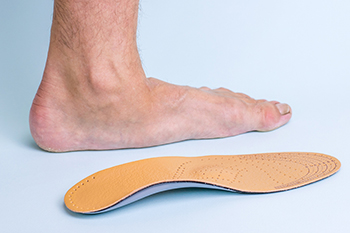
Flat feet are exactly what its name implies. The bottom of the foot lies flat on the ground, due to having little or no arch. Most babies are born with flat feet, and the arch typically develops during the teenage years. Adults with flat feet may have endured a foot injury or been born with an abnormal foot structure. Additionally, obesity, diabetes, high blood pressure, or rheumatoid arthritis may cause flat feet, as well as genetic reasons. Some patients who have flat feet and experience pain in various parts of the foot and ankle may choose to wear orthotics for mild relief. Severely flat feet may affect balance, and the feet may become stiff. If you have flat feet, it is suggested that you consult with a podiatrist who can offer you relief options that are suitable for you.
Flatfoot is a condition many people suffer from. If you have flat feet, contact Bruce Smit, DPM from Frankfort Foot & Ankle Clinic. Our doctor will treat your foot and ankle needs.
What Are Flat Feet?
Flatfoot is a condition in which the arch of the foot is depressed and the sole of the foot is almost completely in contact with the ground. About 20-30% of the population generally has flat feet because their arches never formed during growth.
Conditions & Problems:
Having flat feet makes it difficult to run or walk because of the stress placed on the ankles.
Alignment – The general alignment of your legs can be disrupted, because the ankles move inward which can cause major discomfort.
Knees – If you have complications with your knees, flat feet can be a contributor to arthritis in that area.
Symptoms
Treatment
If you are experiencing pain and stress on the foot you may weaken the posterior tibial tendon, which runs around the inside of the ankle.
If you have any questions please feel free to contact our office located in Frankfort, IL . We offer the newest diagnostic and treatment technologies for all your foot and ankle needs.
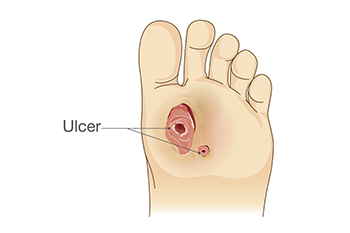
One of the most concerning complications of diabetes is the development of diabetic foot ulcers. A primary culprit behind diabetic foot ulcers is peripheral neuropathy, a condition where nerve damage impairs the ability to feel sensations in your feet. Without pain awareness, you may not notice the pressure your feet experience during everyday activities. This can lead to developing blisters, lesions, or sores. If these injuries are not attended to, they may evolve into foot ulcers. Another significant factor in the development of diabetic foot ulcers is poor blood flow, which can happen as a result of conditions such as peripheral arterial disease. Inadequate blood supply can hinder proper wound healing, making minor injuries prone to infections. Diabetic foot ulcers are a serious concern, and understanding the causes, in addition to taking preventive measures, can significantly reduce the risk. If you have diabetes, it is strongly suggested that you schedule regular check ups with a podiatrist who can both monitor and treat any foot problems as they arise.
Diabetic foot care is important in preventing foot ailments such as ulcers. If you are suffering from diabetes or have any other concerns about your feet, contact Bruce Smit, DPM from Frankfort Foot & Ankle Clinic. Our doctor can provide the care you need to keep you pain-free and on your feet.
Diabetic Foot Care
Diabetes affects millions of people every year. The condition can damage blood vessels in many parts of the body, especially the feet. Because of this, taking care of your feet is essential if you have diabetes, and having a podiatrist help monitor your foot health is highly recommended.
The Importance of Caring for Your Feet
Patients with diabetes should have their doctor monitor their blood levels, as blood sugar levels play such a huge role in diabetic care. Monitoring these levels on a regular basis is highly advised.
It is always best to inform your healthcare professional of any concerns you may have regarding your feet, especially for diabetic patients. Early treatment and routine foot examinations are keys to maintaining proper health, especially because severe complications can arise if proper treatment is not applied.
If you have any questions please feel free to contact our office located in Frankfort, IL . We offer the newest diagnostic and treatment technologies for all your foot and ankle needs.

Proper footwear is paramount for maintaining healthy feet. Ill-fitting shoes can lead to any number of foot problems and even increase the risk of injury. To safeguard your foot health, it's important to select shoes that not only fit well but also provide adequate support. When making your choice, consider the nature of your activity, the type of surface you'll be on, and the need for proper support. For instance, people who spend substantial time on hard surfaces may be more susceptible to heel and forefoot pain, as well as calluses and corns. Supportive shoes with softer soles and arch supports may help. High heels, which force the feet into unnatural positions, can result in long-term postural changes and increase the chances of toe deformities, such as bunions. For active people, the right footwear can ensure proper shock absorption and stability. Seek sports shoes that offer flexibility at the ball of the foot and ample heel support. If foot problems develop or persist, it is suggested that you make an appointment with a podiatrist.
It is important to find shoes that fit you properly in order to avoid a variety of different foot problems. For more information about treatment, contact Bruce Smit, DPM from Frankfort Foot & Ankle Clinic. Our doctor will treat your foot and ankle needs.
Proper Shoe Fitting
Shoes have many different functions. They cushion our body weight, protect our feet, and allow us to safely play sports. You should always make sure that the shoes you wear fit you properly in order to avoid injuries and deformities such as: bunions, corns, calluses, hammertoes, plantar fasciitis, stress fractures, and more. It is important to note that although a certain pair of shoes might be a great fit for someone else, that doesn’t mean they will be a great fit for you. This is why you should always try on shoes before buying them to make sure they are worth the investment. Typically, shoes need to be replaced ever six months to one year of regular use.
Tips for Proper Shoe Fitting
The shoes you buy should always feel as good as they look. Shoes that fit properly will last longer, feel better, and improve your way of life each day.
If you have any questions, please feel free to contact our office located in Frankfort, IL . We offer the newest diagnostic and treatment technologies for all your foot care needs.
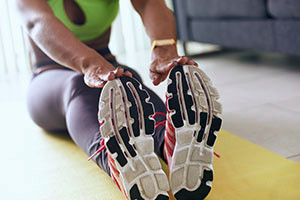
Running, a pursuit of both fitness and freedom, can sometimes lead us down a path of unexpected injuries. These common setbacks can put a temporary halt to our stride. Plantar fasciitis, which is characterized by stabbing heel pain, can result from overpronation and wearing inadequate footwear. Achilles tendonitis, an inflammation of the Achilles tendon, can occur due to overuse or tight calf muscles. Preventing running injuries involves a balanced approach consisting of a proper warm up, cross-training to avoid overuse, and a gradual increase in training. Additionally, it is beneficial to maintain strong core muscles, and invest in quality footwear. Acknowledging these risks empowers runners to take proactive steps towards injury-free and enjoyable runs. If you would like more information about how running injuries can affect the feet and how to prevent them, it is suggested that you confer with a podiatrist who can provide you with the knowledge you are seeking.
All runners should take extra precaution when trying to avoid injury. If you have any concerns about your feet, contact Bruce Smit, DPM of Frankfort Foot & Ankle Clinic. Our doctor will treat your foot and ankle needs.
How to Prevent Running Injuries
There are a lot of mistakes a runner can make prior to a workout that can induce injury. A lot of athletes tend to overstretch before running, instead of saving those workouts for a post-run routine. Deep lunges and hand-to-toe hamstring pulls should be performed after a workout instead of during a warmup. Another common mistake is jumping into an intense routine before your body is physically prepared for it. You should try to ease your way into long-distance running instead of forcing yourself to rush into it.
More Tips for Preventing Injury
If you have any questions, please feel free to contact our office located in Frankfort, IL . We offer the newest diagnostic and treatment technologies for all your foot care needs.
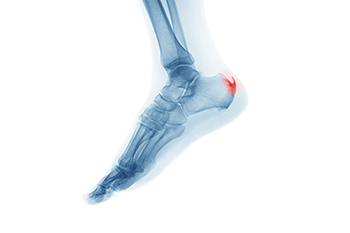
Heel spurs, those tiny bony protrusions at the base of the heel, can spark significant discomfort and hinder daily activities. Heel spurs occur as a result of calcium deposits accumulating over time, often caused by strains on the foot's ligaments and muscles. Individuals who engage in repetitive activities or those with flat feet are particularly susceptible. Symptoms include sharp pain, especially while walking or when standing after rest, in addition to tenderness and inflammation. Understanding the underlying causes is pivotal for addressing heel spurs. Treatments encompass a range of approaches that can range from rest, wearing orthotic inserts to taking anti-inflammatory medications. In more severe cases, medical interventions such as surgery may be considered. With proper care and treatment, individuals can regain comfort and resume daily activities. If you have developed a heel spur, it is strongly suggested that you are under the care of a podiatrist who can effectively diagnose and treat this ailment.
Heel spurs can be incredibly painful and sometimes may make you unable to participate in physical activities. To get medical care for your heel spurs, contact Bruce Smit, DPM from Frankfort Foot & Ankle Clinic. Our doctor will do everything possible to treat your condition.
Heels Spurs
Heel spurs are formed by calcium deposits on the back of the foot where the heel is. This can also be caused by small fragments of bone breaking off one section of the foot, attaching onto the back of the foot. Heel spurs can also be bone growth on the back of the foot and may grow in the direction of the arch of the foot.
Older individuals usually suffer from heel spurs and pain sometimes intensifies with age. One of the main condition's spurs are related to is plantar fasciitis.
Pain
The pain associated with spurs is often because of weight placed on the feet. When someone is walking, their entire weight is concentrated on the feet. Bone spurs then have the tendency to affect other bones and tissues around the foot. As the pain continues, the feet will become tender and sensitive over time.
Treatments
There are many ways to treat heel spurs. If one is suffering from heel spurs in conjunction with pain, there are several methods for healing. Medication, surgery, and herbal care are some options.
If you have any questions feel free to contact our office located in Frankfort, IL . We offer the latest in diagnostic and treatment technology to meet your needs.
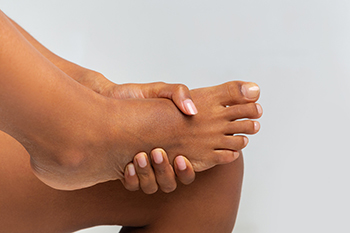
Osteomyelitis, a bone infection caused by bacteria or fungi, can significantly impact the feet if left untreated. It commonly occurs in the feet of adults, and the hips and spine also may be affected. The feet are susceptible to infections through injuries, wounds, or surgeries. Symptoms such as pain, swelling, stiffness, and redness often manifest in the infected feet. Timely diagnosis is crucial, involving physical exams and imaging scans. Treatment options may include antibiotics or surgical removal of infected bone tissue. Prompt wound care and proper footwear play a vital role in safeguarding against osteomyelitis and its potential long-term effects on the feet. If you suffer from this condition, or any type of foot pain, it is suggested that you make an appointment with a podiatrist for a proper examination and care.
Foot Pain
Foot pain can be extremely painful and debilitating. If you have a foot pain, consult with Bruce Smit, DPM from Frankfort Foot & Ankle Clinic. Our doctor will assess your condition and provide you with quality foot and ankle treatment.
Causes
Foot pain is a very broad condition that could be caused by one or more ailments. The most common include:
Diagnosis
To figure out the cause of foot pain, podiatrists utilize several different methods. This can range from simple visual inspections and sensation tests to X-rays and MRI scans. Prior medical history, family medical history, and any recent physical traumatic events will all be taken into consideration for a proper diagnosis.
Treatment
Treatment depends upon the cause of the foot pain. Whether it is resting, staying off the foot, or having surgery; podiatrists have a number of treatment options available for foot pain.
If you have any questions, please feel free to contact our office located in Frankfort, IL . We offer the newest diagnostic and treatment technologies for all your foot care needs.
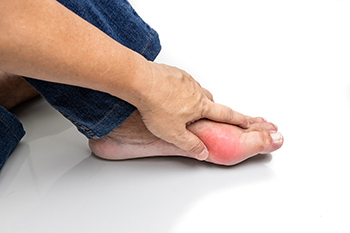
Gout is a form of arthritis and is caused by an overabundance of urates in the system. The urates can form needle-like crystals in the joints, commonly in the big toe. Sudden bouts of extreme pain, swelling, redness, and stiffness develop almost out of nowhere and can last a week or more. They can start at any time and are often experienced at night. Besides genetics and certain lifestyle choices, one of the main causes of gout is eating foods and drinking beverages rich in purines. These can be found in red meat, organ and game meats, and even turkey. The types of seafood that are rich in purines are herring, scallops, mussels, codfish, tuna, and trout. In addition, sugary drinks and foods that are high in fructose contain large amounts of purines. While alcoholic beverages are not high in purines, they can inhibit the kidneys from eliminating uric acid, which furthers the buildup of urates. Gravy and meat sauces, as well as yeast and yeast extracts, are also high in purines. For more information on ways to reduce uric acid and cut back on the effects of gout, it is suggested that you make an appointment with a podiatrist who is trained to deal with this condition.
Gout is a painful condition that can be treated. If you are seeking treatment, contact Bruce Smit, DPM from Frankfort Foot & Ankle Clinic. Our doctor will treat your foot and ankle needs.
What Is Gout?
Gout is a form of arthritis that is characterized by sudden, severe attacks of pain, redness, and tenderness in the joints. The condition usually affects the joint at the base of the big toe. A gout attack can occur at any random time, such as the middle of the night while you are asleep.
Symptoms
Risk Factors
Prior to visiting your podiatrist to receive treatment for gout, there are a few things you should do beforehand. If you have gout you should write down your symptoms--including when they started and how often you experience them, important medical information you may have, and any questions you may have. Writing down these three things will help your podiatrist in assessing your specific situation so that he or she may provide the best route of treatment for you.
If you have any questions, please feel free to contact our office located in Frankfort, IL . We offer the newest diagnostic and treatment technologies for all your foot care needs.
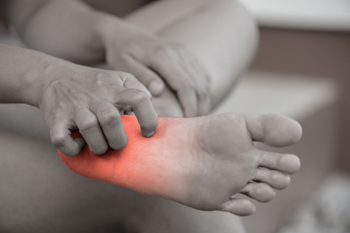
Foot neuropathy is characterized by nerve damage affecting foot sensation and function. It can result from various underlying conditions, including diabetes, alcohol abuse, vitamin deficiencies, and certain medications. As foot neuropathy progresses, individuals may experience tingling, burning sensations, numbness, or weakness in their feet. Over time, this condition can lead to foot ulcers, infections, and difficulties with maintaining balance and walking. The treatment of foot neuropathy depends on its cause and severity. Approaches may include managing the underlying condition, administering medications to control pain or nerve inflammation, physical therapy, and lifestyle modifications. If you are experiencing this discomfort, it is strongly suggested that you make an appointment with a podiatrist who is well-versed in dealing with this condition.
Neuropathy
Neuropathy can be a potentially serious condition, especially if it is left undiagnosed. If you have any concerns that you may be experiencing nerve loss in your feet, consult with Bruce Smit, DPM from Frankfort Foot & Ankle Clinic. Our doctor will assess your condition and provide you with quality foot and ankle treatment for neuropathy.
What Is Neuropathy?
Neuropathy is a condition that leads to damage to the nerves in the body. Peripheral neuropathy, or neuropathy that affects your peripheral nervous system, usually occurs in the feet. Neuropathy can be triggered by a number of different causes. Such causes include diabetes, infections, cancers, disorders, and toxic substances.
Symptoms of Neuropathy Include:
Those with diabetes are at serious risk due to being unable to feel an ulcer on their feet. Diabetics usually also suffer from poor blood circulation. This can lead to the wound not healing, infections occurring, and the limb may have to be amputated.
Treatment
To treat neuropathy in the foot, podiatrists will first diagnose the cause of the neuropathy. Figuring out the underlying cause of the neuropathy will allow the podiatrist to prescribe the best treatment, whether it be caused by diabetes, toxic substance exposure, infection, etc. If the nerve has not died, then it’s possible that sensation may be able to return to the foot.
Pain medication may be issued for pain. Electrical nerve stimulation can be used to stimulate nerves. If the neuropathy is caused from pressure on the nerves, then surgery may be necessary.
If you have any questions, please feel free to contact our office located in Frankfort, IL . We offer the newest diagnostic and treatment technologies for all your foot care needs.